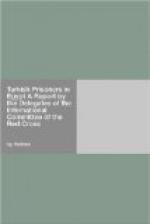We express our deep gratitude to the English authorities for all the facilities which they gave us for the accomplishment of our mission.
We will now sum up the whole set of observations made by us.
We visited the camps of Heliopolis, Maadi, the Citadel of Cairo, Ras-el-Tin, Sidi Bishr, and the hospitals of Abbassiah and the Egyptian Red Cross.
The camps are situated in healthy localities, and their dimensions are amply sufficient for the population that they hold. The accommodation seems to us exactly suited to the conditions of the country and climate. Whether barracks are specially constructed for the prisoners, or stone buildings are adapted to their use, these results are obtained.
Ventilation is sufficient everywhere. Measures of protection against the cold, so difficult to render effective in other countries, are unimportant here, owing to the mildness of the climate. Both boarded and beaten earth floors are kept perfectly clean.
The bedding of the prisoners of war (non-commissioned officers and privates) is composed of plaited rush mats, such as they are accustomed to use when at home. These mats are regularly cleansed, and replaced as they wear out. The officers, civilian prisoners and sick are provided with iron spring beds, and mattresses generally stuffed with vegetable fibre. For hospitals and officers, pillows and coverlets are also supplied.
The blankets assigned to each prisoner vary from 3 to 5, a number which we have never seen equalled in other places.
As to clothing, the military authorities furnish the men with all that is necessary: 2 pairs of drawers, 2 flannel shirts, 2 pairs of socks, a woollen belt, 1 neckerchief, 1 pair of trousers, a tunic of blue cloth (or beige) and a cloak. All these garments are warm, clean, and of good quality. All the Turks wear the national head-covering, the fez. Decorations are allowed to be worn unrestrictedly. Owing to the date of our visit we were not able to inspect the summer outfit, but the prisoners told us that in the hot season they wore blue linen suits.
The civilian prisoners whose personal belongings were worn out received a complete equipment.
The interned civilians were decently and sufficiently clothed.
Officers can order their clothes at their own expense from the town tailors.
The private soldiers all wear the oriental slippers; non-commissioned officers are given high-lows. All necessaries for repairs are provided by the camp administration.
Everywhere we found the prisoners adequately and suitably dressed. No external mark shows their position as prisoners of war, except a metal medallion attached to the tunic.
We can assert that the commissariat of the Egyptian prisoners leaves nothing to be desired. The fact that the prisoners prepare their own food insures them a diet suitable to their tastes and customs. The quantities supplied are calculated upon a very liberal scale. The quality, whether of bread, meat or vegetables, is excellent and constant.




